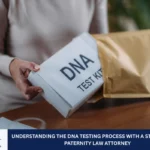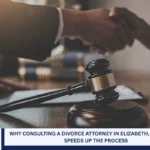In Elizabeth, New Jersey, a divorce attorney can help when one spouse refuses to accept divorce papers. While this situation may complicate the process, it doesn’t necessarily prevent the divorce from moving forward. Understanding your legal rights and the options available to you is crucial when dealing with a spouse who is unwilling to cooperate.
This article will walk you through what happens if a spouse refuses to accept divorce papers in Elizabeth, New Jersey. We’ll also discuss how a divorce attorney can help you handle these challenges and ensure that your divorce proceeds as smoothly as possible.
Understanding Divorce Laws in Elizabeth, NJ

Before diving into the specifics of how to handle a spouse who refuses divorce papers, it’s crucial to understand the divorce laws in New Jersey, as they shape the overall process. Elizabeth, located in Union County, follows the same legal principles as the rest of the state. Here are key aspects of New Jersey divorce law that impact the divorce process.
New Jersey Divorce Laws
In New Jersey, divorce laws are structured to protect both parties and to provide a fair framework for resolving conflicts. Divorce proceedings may be initiated under several grounds, including no-fault divorce, which is the most common. Here are the primary elements:
- No-Fault Divorce: In New Jersey, no-fault divorce is available. This means that one spouse can file for divorce without needing to prove any wrongdoing on the part of the other party. This makes it easier for individuals who cannot continue their marriage due to irreconcilable differences.
- Residency Requirement: To file for divorce in New Jersey, either spouse must have resided in the state for at least 12 consecutive months before filing. This rule ensures that the case remains within the jurisdiction of New Jersey courts.
- Grounds for Divorce: Aside from irreconcilable differences, New Jersey also recognizes several other grounds for divorce, such as adultery, cruelty, desertion, and separation for more than 18 months.
In the case of a divorce attorney intervention, understanding these factors is essential for both initiating the process and handling complications such as a spouse refusing to cooperate.
The Divorce Process in New Jersey

Divorces in New Jersey follow a structured process, beginning with the filing of a divorce complaint and concluding with the court’s issuance of a final decree. Here’s an overview of the typical steps involved:
1. Filing the Complaint for Divorce
The divorce process begins with the filing of a Complaint for Divorce. The filing spouse, also known as the “plaintiff,” submits this formal legal document to the court, outlining the reasons for the divorce and any claims for custody, alimony, or division of assets. This complaint officially starts the divorce proceedings.
2. Serving the Divorce Papers
Once the complaint is filed, the plaintiff must serve divorce papers to the other spouse, known as the “defendant.” Serving the papers can be done through various methods, including personal service by a process server, certified mail, or even through a family member. However, the spouse being served must be made aware of the complaint.
3. Responding to the Divorce
After being served, the defendant has 35 days to respond. They can either file an answer to the complaint, ignore it, or file a counterclaim for divorce. The court may proceed with default procedures if no response is received.
4. Discovery and Negotiation
During this stage, both parties exchange information about finances, assets, debts, and any other matters that require resolution. If both parties agree on key issues, such as child custody or property division, they may proceed with an uncontested divorce. If they cannot reach an agreement, the case may proceed to trial.
5. Settlement or Trial
If both parties can reach a mutually agreeable settlement, the divorce will conclude with a mutually agreed-upon agreement. However, if the parties cannot agree, a trial will be scheduled. The judge will hear both sides and make final decisions regarding property division, custody, and support.
What Happens If a Spouse Refuses to Accept Divorce Papers?

If a spouse refuses to accept the divorce papers, it can delay or complicate the process. However, New Jersey law has mechanisms in place to move the case forward even if one spouse refuses to participate in the process.
A. Refusal to Accept Papers
If a spouse refuses to accept the divorce papers or tries to avoid service, the court allows the filing spouse to pursue alternative methods of service. These can include:
- Certified Mail: The court may permit service by sending the divorce papers through certified mail to the spouse’s last known address.
- Publication: In rare cases, when the spouse cannot be located or refuses to respond, the court may allow the papers to be published in a local newspaper, notifying the spouse of the divorce.
B. Ignoring the Divorce Papers
If the spouse chooses to ignore the divorce papers, the filing spouse can request the court to grant a default judgment. After 35 days of no response, the court may move forward with the divorce proceedings without the other spouse’s participation, as long as service can be proven.
C. Delaying or Avoiding Service
Some spouses may actively avoid being served divorce papers. If this happens, the filing spouse can request that the court permit an alternative service method, such as leaving the papers with someone in the household or at the spouse’s workplace.
Legal Options When a Spouse Refuses Divorce

When a spouse refuses to accept or respond to divorce papers, there are several legal options available to ensure that the divorce proceeds smoothly:
1. Request a Default Judgment
If the spouse does not respond within 35 days, the filing spouse may request that the court grant a default judgment. This means that the divorce will proceed without the uncooperative spouse’s participation, and the court will issue a final decree based on the terms proposed by the filing spouse.
2. Request Alternative Service
If the spouse avoids service, your divorce attorney can file a motion with the court to approve alternative methods of serving the papers. These methods may include service by publication or through a third party, like a close relative.
3. Discovery and Subpoenas
Even if the spouse refuses to participate, your attorney can still gather important information through legal discovery tools, such as subpoenas. These documents allow your attorney to collect necessary financial records, witness testimony, or other evidence required for your case.
4. Case Management Orders
In some cases, the judge may issue case management orders to expedite the process. These orders can include deadlines for responses or penalties for non-compliance, which help ensure the divorce doesn’t drag on indefinitely.
What Happens in Default Divorce Cases?
A default divorce occurs when one spouse fails to respond or participate in the divorce process. In New Jersey, even in such cases, the divorce can still proceed.
Step 1: Proving Service
In a default case, the plaintiff must prove that the divorce papers were properly served. This may involve submitting proof that the spouse was notified through mail, substituted service, or other acceptable methods of service.
Step 2: Requesting a Default Hearing
If the spouse does not respond, the plaintiff may file a motion to request a default hearing. During this hearing, the plaintiff will present evidence of the marriage’s dissolution and request the court to grant the divorce.
Step 3: Final Judgment
If the judge finds that the legal requirements are met and there is sufficient evidence, the divorce will be granted. The court will issue a final divorce decree, resolving issues such as property division, custody, and support, based on the plaintiff’s request.
The Role of a Divorce Attorney in Challenging Situations

A divorce attorney is crucial when dealing with a spouse who refuses to accept or respond to divorce papers. The lawyer ensures that your rights are protected and helps guide you through each step of the legal process.
Why You Need a Divorce Attorney
- Legal Expertise: Divorce laws can be complicated, and having an attorney ensures that all legal procedures are followed properly.
- Handling Complications: When your spouse refuses to cooperate, an attorney can step in to request motions, file for default judgment, or ask the court to allow alternative service.
- Ensuring Fairness: An attorney will help ensure that you are treated fairly during the proceedings and that the final divorce decree is in your best interest.
How a Divorce Attorney Can Assist
- Preparation and Filing: They will handle all paperwork, ensuring everything is submitted correctly and on time.
- Representation: If necessary, your attorney will represent you in court, advocating for your rights and interests.
- Negotiation and Settlement: If your spouse is uncooperative, your attorney can help negotiate a fair settlement and prevent the case from going to trial.
Moving Forward with Your Divorce in Elizabeth, NJ
A divorce can be an emotionally and legally challenging experience. When one spouse refuses to accept divorce papers, it can add further frustration to an already complex process. However, it’s important to understand that this refusal does not mean your divorce will be delayed indefinitely. New Jersey law provides several tools to ensure that even when one party is uncooperative, the divorce can still proceed to resolution.
If you are facing difficulties in getting your spouse to accept divorce papers, reaching out to a skilled divorce attorney can help you navigate these challenges. Your attorney will guide you through the available legal options and help ensure that the process moves forward as smoothly as possible. Don’t let one person’s refusal to cooperate derail your future; take control and work with professionals who understand how to manage the process effectively.
Elizabeth Divorce Attorney – Soren Law Group

Looking for help with a spouse who refuses to accept divorce papers? The team at Soren Law Group is ready to guide you through the process. Our experienced divorce attorneys in Elizabeth, NJ, are well-versed in handling uncooperative spouses and can help you move your case forward without unnecessary delays.
With extensive experience in family law, we are dedicated to providing effective and personalized legal services. We aim to make your divorce process as smooth as possible, so you don’t have to worry about complications. From child custody to property division, our attorneys will work diligently to protect your best interests. Contact us today at (718) 815-4500 to schedule a consultation and take the first step toward resolving your issue.
FAQ: Divorce Process in Elizabeth, New Jersey
What is the Divorce Process in Elizabeth, New Jersey?
The divorce process in Elizabeth, New Jersey, begins with the filing of a Petition for Divorce by one spouse, known as the Petitioner. This document officially initiates the process of dissolving the marriage. New Jersey is a no-fault state, meaning neither party is required to prove wrongdoing to file for divorce—irreconcilable differences or an irretrievably broken marriage are accepted grounds.
Once the divorce petition is filed, the other spouse must be served with divorce papers, initiating the service of process. If they do not respond within 35 days, the Petitioner can request a default order from the court. If both parties agree on all terms, including child support, spousal support, and property division, they may proceed with an uncontested divorce. Otherwise, a contested divorce may result in court hearings and potentially a divorce settlement agreement.
What is the Difference Between Contested and Uncontested Divorce?
A contested divorce occurs when the spouses cannot agree on one or more key issues, such as child custody, child support, or spousal support. This type of divorce often requires lengthy legal battles in divorce court, with both parties presenting evidence and arguments to the judge. Divorce attorneys typically represent each spouse, offering legal representation to navigate the process.
In contrast, an uncontested divorce is when both spouses agree on all matters, including the division of assets, debts, and support. This type of divorce is typically quicker and less expensive, as it doesn’t require litigation. Spouses typically work with a divorce lawyer to create a settlement agreement, which is then submitted to the court for approval and review. In some cases, the Petition for Divorce may be handled through summary dissolution, where both parties file a joint divorce petition and agree on all terms of the divorce.
How Does the Waiting Period Work in New Jersey?
In New Jersey, the waiting period for a divorce is a minimum of 90 days, which starts once the divorce petition is filed. This waiting period is mandatory in cases where the spouses are seeking a divorce based on mutual consent or irreconcilable differences.
During this time, couples may use the period to negotiate a settlement agreement regarding issues like child support, property division, and spousal support. If the couple settles on the end of the waiting period, the divorce can proceed as an uncontested divorce, which generally leads to a quicker final judgment. However, if no agreement is reached, the case will likely proceed as a contested divorce, with a court hearing to resolve the outstanding issues.
What is a Default Order in Divorce?
A default order can be requested if the spouse receiving the divorce petition fails to respond within the required timeframe, which is 35 days after being served with the divorce papers. If the non-responsive spouse does not file an answer, the Petitioner may seek a default order from the court.
Once the default order is granted, the divorce can proceed without the non-responding spouse’s participation. In most cases, the divorce court will proceed with the dissolution of the marriage, and the Petitioner may receive their desired terms, including spousal support or child support. However, the court may still require a hearing if there are unresolved issues such as custody or property division.
What Should I Expect During the Divorce Court Hearing?
If your divorce is contested, you will likely need to attend a divorce court hearing. During this time, both spouses and their divorce attorneys present evidence to support their positions on issues such as child support, spousal support, and property division.
The judge will listen to both sides and issue a ruling based on New Jersey family law. In many cases, the judge will suggest that the parties try to reach a mutual consent agreement or negotiate a settlement agreement outside of court. If this is not possible, the judge will make a final ruling. Legal counsel can be invaluable during this process, as they provide expert legal advice and help ensure the best possible outcome for their clients.
Can I Handle a Divorce Without a Lawyer?
While it is possible to represent yourself in a divorce, having a divorce lawyer is highly recommended, especially in contested cases. Legal counsel helps ensure that your rights are protected and that you receive fair terms in matters like child support, spousal support, and property division.
Representing yourself in a divorce petition may result in missing important steps or failing to understand your full legal rights. A divorce attorney provides the expertise needed to navigate complex family law issues, offering legal representation throughout the divorce process. They will also help you prepare and file the divorce petition and ensure all documents are filed correctly to avoid delays.
What is the Petition for Dissolution of Marriage?
The Petition for Dissolution of Marriage is the formal legal document filed by the Petitioner in a divorce case. This petition initiates the legal process of dissolving a marriage. It includes important details, such as the grounds for divorce and any claims for child support, spousal support, or division of assets.
In New Jersey, a Petition for Divorce is typically filed when a spouse seeks a no-fault divorce, citing an irretrievably broken marriage or mutual consent. The petition must be served to the other spouse, who then has a specified amount of time to respond. The response can determine whether the divorce is contested or uncontested, which in turn affects the course of the legal proceedings.
Read more: What Happens if You Get a Paternity Test Without Consent? Ask a Staten Island Paternity Law Attorney











